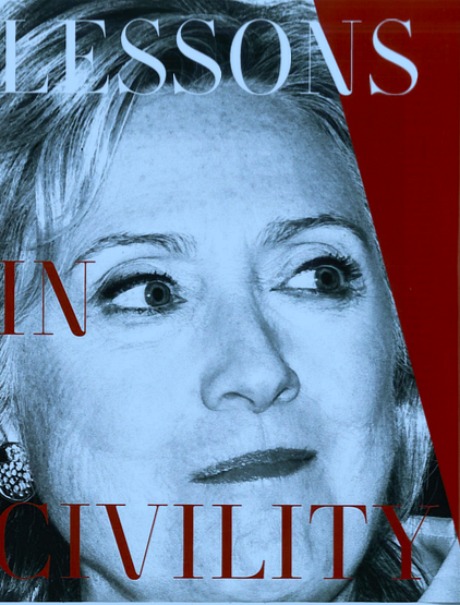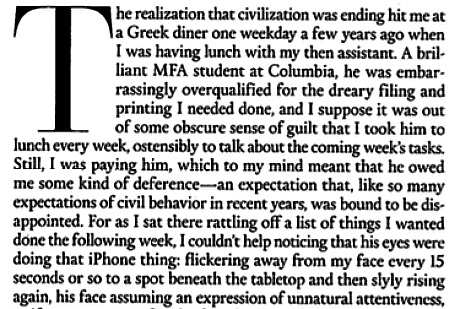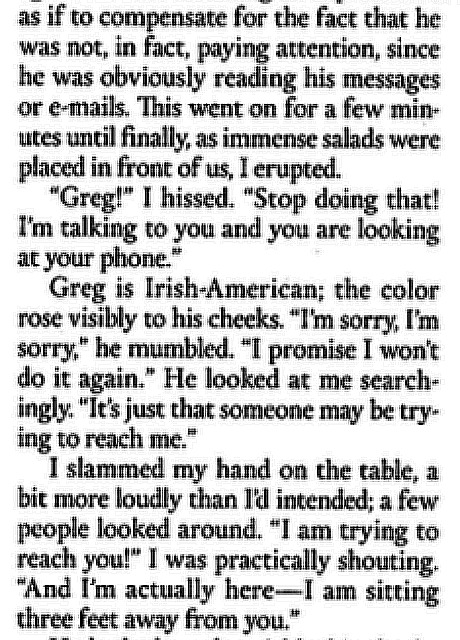There’s a piece in the August issue of Town and Country, written by Daniel Mendelsohn (who is not, as far as I know, related to HE’s constantly sweating, cigarette-smoking Ben Mendelsohn) and dated 6.29.16.
Definitely not aimed at under-40 readers, the piece is called “Is This the End of Civility As We Know It?” and is basically about how social media has created a more self absorbed and narcissistic population. The message is moot but stated nonetheless: when you’re out and about, it’s uncivil to engage in a more profound relationship with one’s cell phone than with the person or universe in front of you. And more than that, it makes you an idiot.

Related quote: “The Greeks had a special horror of people who imported their private concerns into the public arena — the agora, where civic life unfolded.
“In fact, they had a word for that kind of person. Idiotes is derived from the adjective idios, which means private. Originally its meaning was innocuous: a private person. But precisely because life in a city like Athens or New York takes place in shared spaces as well as in private ones, the word came to mean someone who was irritatingly, stubbornly, contrarily ‘private’ even when he shouldn’t be.
“Over many centuries the last syllable of the word was eroded away by a million lips in 10,000 cities, from Athens to Constantinople to Antioch to Rome, leaving us with what is, when you think about it, as good a term as any to describe a figure who clomps obliviously down a city street while seemingly talking to himself, or sucker-punches someone for having different views, or practices any number of other behaviors that we would once have laughed at but now have become appallingly common: idiot.”
A friend sent me the article this morning; I responded as follows:
“By Mendelsohn’s realm, by his standards, I mostly qualify as one of his idiots. But not entirely. I always hold eye contact a bit longer than most people seem to. I always give someone my full attention whenever they say something to me or, you know, when we’re actually conversing over lunch or dinner, or for a minute or so. I not only listen but fully consider what’s being said to me.
“Even if a colleague or a dinner partner is saying something mundane or boring, I always fight the urge to look at my phone. If I’m with someone at dinner and I find myself reading an email or a text, I’ll share the content and my reaction to it.
“So I’m aware of what Mendelsohn is bitching about. I value civility. I always say please, thank you. I’m always aware when I’m behaving like an iPhone asshole. I know I’m not behaving as I should, but at least I’m making an effort not to be obnoxious about it. If I need to check something I’ll stand off to the side or in a quiet corner somewhere.
“But I used to tune out a lot before smart phones became ubiquitous. If I was conversing with someone in the ’80s or ’90s who was seriously boring me, I would subtly excuse myself from the conversation by not really listening. It happens.
“Tuning out has always been a big part of my life. I got lousy grades in junior and senior high school because of this. In the late ’70s, ’80s and ’90s I would walk for blocks and blocks in Manhattan, and would sometimes fall into little dreams or mood funks. I would “leave” for minutes but sometimes for an hour or so. We all take little vacations in our heads.”


